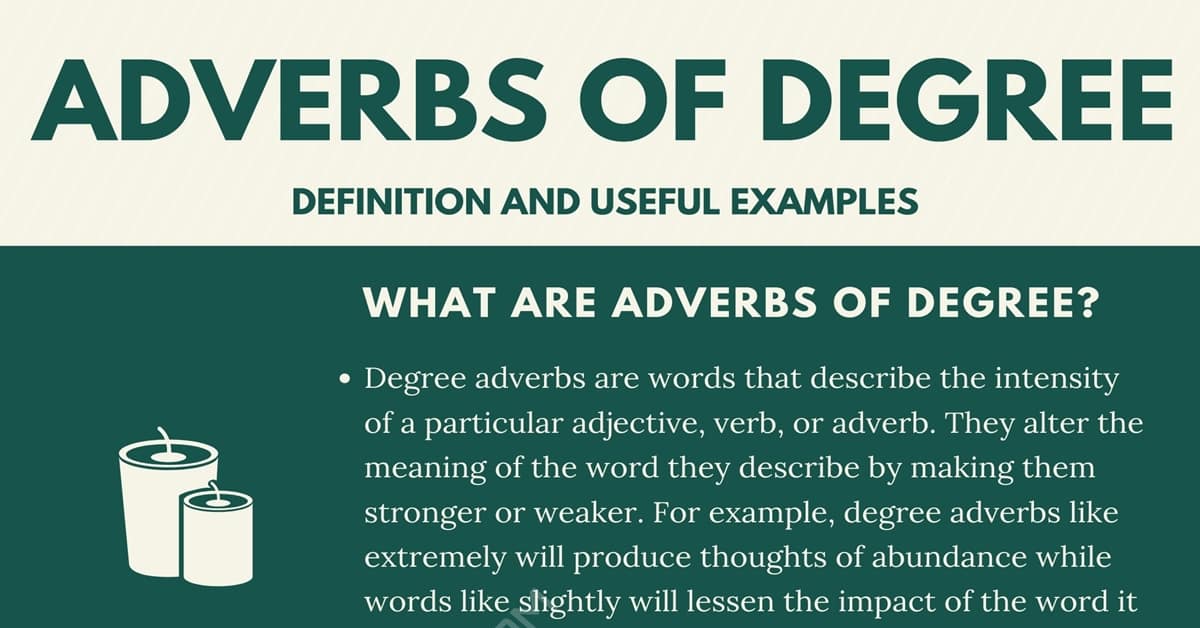Adverbs of Degree! Adverbs are words that describe or morph the meaning of an adverb, verb, or adjective. Adverbs can be broken down into eight different categories: conjunction, place, time, frequency, manner, comment, negation and confirmation, and finally degree. Today we show you how to use the adverbs of degree in English with some useful examples.
Adverbs of Degree
What Are Adverbs of Degree?
Degree adverbs are words that describe the intensity of a particular adjective, verb, or adverb. They alter the meaning of the word they describe by making them stronger or weaker. For example, degree adverbs like extremely will produce thoughts of abundance while words like slightly will lessen the impact of the word it seeks to modify.
Some common degree adverbs include: too, slightly, completely, very, fairly, and bit.
When writing or speaking you sometimes want to denote to what extent something impacts you. Sometimes to communicate clearly you want to be able to qualify certain descriptions. For instance, you can qualify temperature in terms of hot, cold, or warm. Certain words will paint a clearer picture of how cold something felt to you. For example, It could be slightly cold, a bit cold, or really cold.
Alternatively, you could describe how tired a friend appeared to you. Did your friend look a wee tired or quite tired? These words influence the severity of something. Depending on which adverb was chosen the severity could increase or decrease.
- Examples of adverbs that increase the severity of a situation include: completely, very, and absolutely.
- Examples of words that lessen the severity of something are a bit, a little, and slightly.
How to Use Adverbs of Degree
Most of the words used to describe the intensity of something are placed before the verb, adjective, or adverb they wish to qualify. A small portion of these words, however, do not follow this formula.
Examples of adverbs that precede verbs, adjectives, or adverbs
- The doctor was extremely old.
- The dog is too small.
Both of these examples are of degree adverbs that precede adjectives. In the first sentence, the adverb extremely modifies the adjective old. In the second sentence, the adverb too comes before the adjective. Each adverb describes how cold or small the subject appears. When the adverb “too” appears in the second sentence it conveys a problem.
Notes these adverbs can also be used to speak to the degree of a verb or other adverb.
Examples of adverbs that follow verbs, adjectives, or adverbs
Unlike the above set of degree adverbs, the adverb enough appears after the verb, adverb, or adjective being modified. Enough means to the extent something is necessary when used as an adverb.
- She could not eat enough.
- The dough would not be hard enough.
Enough follows the verb eat in the first sentence and the adjective hard in the second.
To + the infinitive form often follow the adverb “enough“. For example:
- She could not eat enough to repress the memory.
- The dough would not be hard enough to throw.
In the first sentence, the word enough follows the infinitive “to suppress.” In the second sentence, the word enough follows the infinitive “to throw.”
Adverbs of Degree List
Listed below are words you can use to shape the degree of something.
- almost
- awfully
- a little
- entirely
- completely
- most
- lots
- somewhat
- too
- fairly
- rather
- enough







0 Comments